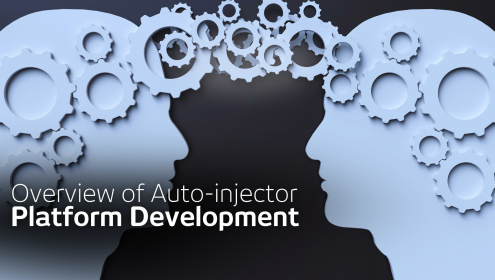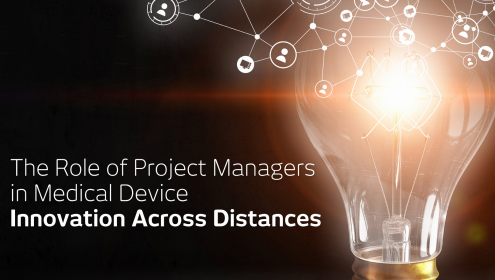Project Management
Ayelet Tal Shahar | 14.07.2022

Much has been written about projects and project management – including the different approaches and methodologies employed by Project Managers.
At Elcam Drug Delivery Devices (E3D), we define project management in terms of the preparation of the relevant skills, tools, knowledge, and techniques required to deliver the desired result.
Once the scope and objectives for a project have been established, selecting people with the appropriate skills, and combining these with relevant knowledge to create the most suitable project team, typically represents the first challenge in successfully undertaking and executing any project. Managing that project team and enabling each team member to contribute the appropriate knowledge and experience, whilst coordinating the activities of the team, is the primary task of the Project Manager and key to achieving a successful project outcome.
Project Definition
Within E3D, we define a project as a specific endeavor with a clear beginning and end – and that has a clearly defined purpose. This includes determining methodologies, execution, measurable goals – which are pre-established for the desired end result – together with quality standards and performance, project schedule, agreed scope – and, of course, a realistic and achievable financial budget to achieve the set goals. For any project, clear objectives must be set and communicated to all stakeholders, taking into consideration the project’s purpose, concept, requirements, and projected financial return – structured with a predetermined timeline in which all of these objectives are to be accomplished.
Within E3D projects, we often share responsibility with our partners (e.g. pharmaceutical companies) for the development of a new injector device or for customization of an existing device platform as a basis for a partner’s injectable drug/device combination product. In doing so, we identify at the outset those process steps to be undertaken – from device design and development through to support for regulatory submissions, to production and successful commercialization of the device.
E3D employs an established project management methodology that incorporates stage gates of preliminary, detailed, and critical design reviews (for both product and manufacturing processes). Other key elements of this methodology are ongoing risk management throughout the development process, product verification (involving both internal and external test laboratories), biocompatibility, shipping tests, formative and summative device usability & human factors studies, process validation tests, and eventual design transfer to the relevant manufacturing facilities – at all times performed in accordance with well-established methodologies.
Since, however, each project and each partner has specific requirements, with corresponding challenges, we believe that it is essential to also employ a flexible and responsive approach. As such, within its established systems, E3D can adjust project phases and timelines according to partners’ internal and external constraints and needs. In this way, we can take account of, and accommodate all aspects of, the product life cycle – from the definition of an opportunity, planning of the project, design, verification & validation, and evaluation.
Approach to Project Management
As Project Manager, I have to look at the skills and knowledge required to successfully execute any particular project and identify those people possessing the attributes to undertake the project and achieve the defined objectives.
Projects invariably require multidisciplinary expertise and at E3D we pride ourselves in housing the various skill sets under one roof. Using the Work Breakdown Structure (WBS), we define a deliverable-oriented structure, broken into discrete steps and phases, until the entire project is thoroughly accounted for. Identifying and communicating these detailed steps is a critical factor in materializing the overall project.
Within E3D, a project is typically initiated on the basis of interaction between our marketing and business development colleagues, with a pharmaceutical company that has identified a need for a drug delivery device that can be addressed via one of E3D’s device technology platforms. Through dialogue with such a partner, the specific requirements for their device, and the manner in which these requirements will be met with the technology platform, are defined.
Once the project’s goals are set, the means to reach these goals must be mapped out. This process breaks down the many different elements of the project and collates a detailed project plan which details all activities and sub-goals – along with the interdependencies of such – as well as definition of required resources and all associated timelines and responsibilities. The project plan is separated into main phases of Initiation, Planning, and Execution, with each phase being further divided into detailed stages and tasks, which are then assigned to specific members of the project team.
This planning process takes into consideration the scope of the project, mapping out the necessary collaborations of each of the different skill holders within the team, and combining their respective expertise.
Once the detailed project plan has been defined, work on the project can commence, with our experienced engineers collaborating with our commercial partners to achieve the device design which meets all specified requirements. During the course of the project, this design will be analyzed, tested, and iteratively refined, with prototype devices being built using techniques such as rapid 3-D printing, as appropriate for each specific test. Once the design has been finalized, it is verified according to the specified requirements and in compliance with applicable standards.
Consideration of device manufacturing processes and facilities, as well as material and component supply chain, is an integral element of our design activities. Once manufacturing systems are established, the equipment and processes are qualified and validated, enabling the eventual production of devices that are appropriate for clinical and commercial purposes.
Although each member of the project team brings their own particular skills and knowledge, the Project Manager must coordinate the project team to combine expertise, setting priorities for activities in order to achieve the set goals, within the required timelines and budget.
Monitoring and managing the progress of project tasks, using defined milestones, is essential in enabling the Project Manager to monitor and control the project – while use of established and proven project management methodology ensures that the appropriate tools and resources are available to achieve a successful conclusion… Each completed project takes E3D a step closer to realizing the goal of providing quality products to our partners, whilst expanding our product and technology offering.
Although the challenges associated with project management are considerable, successful delivery of a project are especially satisfying. Knowing that you have the responsibility to bring a new product to the market is both motivational and personally fulfilling.






